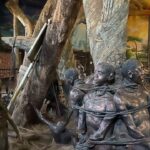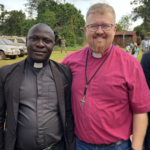
The Twin Towers Memorial – What We Can Learn About The Christian Faith
THE LOSS OF INNOCENCE
Yesterday marked the 18th anniversary of the World Trade Center Twin Towers tragedy. Like many of you, I remember helplessly listening and watching their destruction. It’s hard to imagine that 18 years have passed, yet the memory of their downfall still seems fresh.
As I reflect on that moment in history, a few things come to my mind that I would like to share.
The day the towers fell, I was 24 years old, and just beginning my adult life as a young married man and an employee for a Corporate 500 company. As a young adult, I never really knew the world that was lost, the age of security and innocence that seemed gone in a split second. Ivey and I were still idealistic and naive, ready to take on the world and make a difference. But the world seemed to change even though we didn’t fully understand how.
Instead, we came of age in a world marked by horrific terrorism, a perpetual war, and a country marked by hostile political division characterized by competing ideologies.
Villians on network television shows featured individuals who hated our country, our ideals, and our values but the root of the hatred were hotly contested. Was it religious fundamentalism or religious terrorism? How one answered that question said a lot about a person’s view of religious faith.
Of course, their plots were foiled by heroic characters who seemed to curb the threat at the last second, but the eerie parallel to real-life left the viewer with a sense of unease.
TEACHING OUR CHILDREN
All of this came back to my mind this past summer. My wife and I took our children to the Twin Tower memorial. Where two towering buildings once pierced the sky, now stands two giant square holes in the ground. Of course, they are not merely holes. Instead, they are lovely pools of water cascading down into an unseen abyss. The architect had tears in mind at the souls lost in the tragic attack.
When I think about those pools, the poetry of Psalms 89:4 captures the moment, “What man can live and not see death? Can he deliver his soul from the power of Sheol?” The answer? No one.
While we were there, like good parents, we tried to explain to our children the memorial’s significance and why we took the time to visit. Of course, to them, they were nothing more than giant fountains. Our youngest even wanted to throw a penny into one of them to make a wish. To them, the real events that took place at the memorial site were abstractions, a story of events which occurred before their time.
For our children, the monuments do not have the deep emotional attachments that Ivey and I experience. How could they? They were not around. But the pools still have significant importance that must be taught to the next generation.
A CHRISTIAN MEMORIAL
What is true for 9/11 remains true for another memorial, the cross of Christ.
Like our children, we may not fully understand the significant emotional devastation and paradoxically, celebration first experienced by the original disciples. But we can still enter into the significance of the empty cross by realizing its meaning for our lives. And unlike the 9/11 memorial that sits in Manhattan, signifying the loss of life. We celebrate the salvation of life.
On the eve of Christ’s passion, the memorial of the Lord’s Supper stands as a continual reminder of how the death of one man led to the billions of lives saved.
The Apostle Paul, when he was reflecting on the difference between Adam and Jesus, wrote the following:
17 Since by the one man’s trespass, death reigned through that one man, how much more will those who receive the overflow of grace and the gift of righteousness reign in life through the one man, Jesus Christ (Rom. 5:17 CSB).
Today, there is a risk of losing the significance of the Lord’s Supper through familiarity and the prevalence of unbiblical teaching and practice. That is why we must always be clear in both our presentation and understanding of this precious gift instituted by our Lord.
As you prepare for the weekend, take a moment to reflect on the precious gift of life that we are pointed to at the Lord’s Table.




